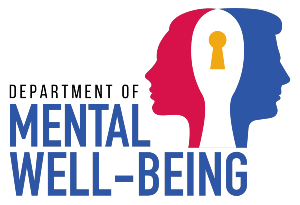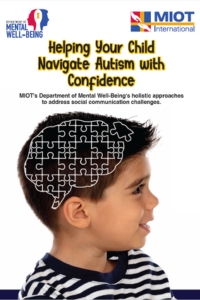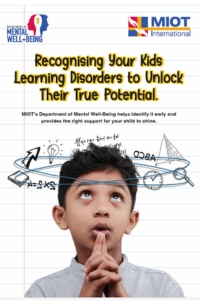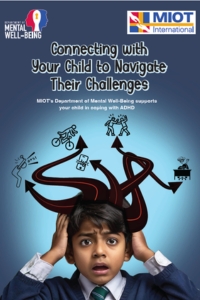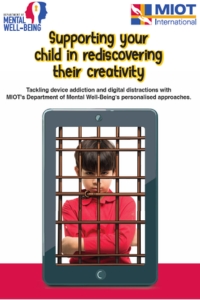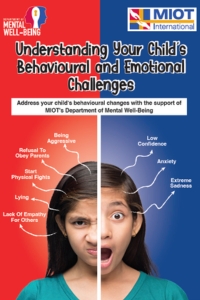Developmental disorders are impairments in cognitive, physical, language, or behavioural development, while autism is a specific developmental disorder marked by challenges in communication, social interactions, and repetitive behaviours. Some major signs to look out for are difficulty in communication, limited speech, trouble with back-and-forth conversations, challenges in social interactions, difficulty understanding social cues, lack of interest in peers, and repetitive behaviours like hand-flapping, insistence on routines. The symptoms may appear in the first year or develop between 18 and 24 months or later.
Our behavioural and developmental specialists recognise that early intervention is crucial for children with Autism Spectrum Disorder, as it helps them reach their full potential. Usually around the time they start school, children's brains are highly adaptable, making them more receptive to positive interventions. This adaptability enhances the potential for significant growth and development through effective therapies and support strategies.
A learning disorder is when a child has problems with reading, math, or writing. They may also have difficulty in using or understanding language, socialising, and learning other skills that don’t involve words. The child’s skills are below what's expected for the child’s age, grade level, and intelligence.
If symptoms persist for more than six months despite support from parents or teachers, it is important to get support from our behavioural and developmental specialists. Their treatment plans can help address the child's challenges and improve understanding, enabling teachers and parents to identify their learning styles and provide tailored resources and guidance.
Attention Deficit / Hyperactivity Disorder (ADHD) is a neurodevelopmental disorder characterised by persistent patterns of inattention, hyperactivity, and impulsivity with symptoms often starting before age 12. Diagnosis at an early stage, could potentially prevent the child from experiencing other problems like low self-esteem, depression, oppositional behaviour, school failure, risk-taking behaviour, etc.
Some of the symptoms to notice are:
Inattention: Difficulty focusing, trouble following through on tasks, forgetfulness in daily activities.
Hyperactivity: Fidgeting, difficulty staying seated, excessive talking, running around in inappropriate situations.
Impulsivity: Interrupting others, difficulty waiting for turns, acting without thinking.
Our Department of Mental Well-Being’s diverse team enables you to gain an in-depth understanding of each child as they develop personalised treatment plans tailored to each child's unique needs, combining therapy, medication, lifestyle changes, and support from loved ones.
Children with emotional and behavioural disorders often exhibit changes in their behaviour related to emotional, physical, and sexual abuse. They may struggle to react appropriately to situations or emotions, frequently throw temper tantrums that continue into school, and experience anxiety, low self-esteem, poor confidence, and sometimes even depression. Later, these children may develop issues related to gender and sexuality.
Our Mental Well-Being experts imply that recognising and acting on symptoms during the onset can minimise distress to the child and family, and prevent problems associated with the condition. They adopt a holistic approach to emotional and behavioural challenges, focusing not only on addressing the symptoms but also on enhancing the child’s overall quality of life.
Compulsive overuse of devices can affect the child both physically and psychologically. Device addiction could lead to anxiety, depression, isolation from loved ones, etc. Children can be distracted from device use by engaging in regular physical activity, pursuing hobbies, or increasing social interactions. Addressing device addiction early is important for the positive growth of the child and to prevent negative impacts on their physical, mental, and social development.
Our behavioural and developmental experts offer tailored intervention strategies designed to gently guide your child in overcoming compulsive behaviours and reshaping their perceptions of devices like smartphones, TVs, tablets, and video games, as well as the internet. Their approach focuses on understanding and supporting your child through this journey.
Our Department of Mental Well-Being equips your child with practical coping strategies while guiding you and their teachers on effective ways to manage learning issues, ADHD, emotional and behavioural difficulties, and device addiction. The process begins with extensive observations of each child over a significant period. They also engage in discussions with their families and teachers regarding the findings, as well as explore ways to apply this information in effectively managing the child’s symptoms. By taking a holistic, multi-disciplinary approach, we address learning issues, ADHD, emotional and behavioural difficulties, device addiction and related mental well-being challenges. Collaborative care is emphasised, involving parents, teachers, and healthcare providers to create tailored intervention strategies. Our multidisciplinary team includes:
- Psychiatrists
- Psychologists
- Developmental Paediatricians
- Speech and Language Therapists
- Physiotherapists
- Occupational Therapists
The integration of various fields of expertise is to gain a comprehensive understanding of each child. Our dedicated team of professionals offers personalised solutions tailored to the unique needs of each child dealing with device addiction. By utilising evidence-based approaches from around the globe and ensuring cultural appropriateness, we help children develop the coping skills and strategies necessary to manage their technology use effectively.
